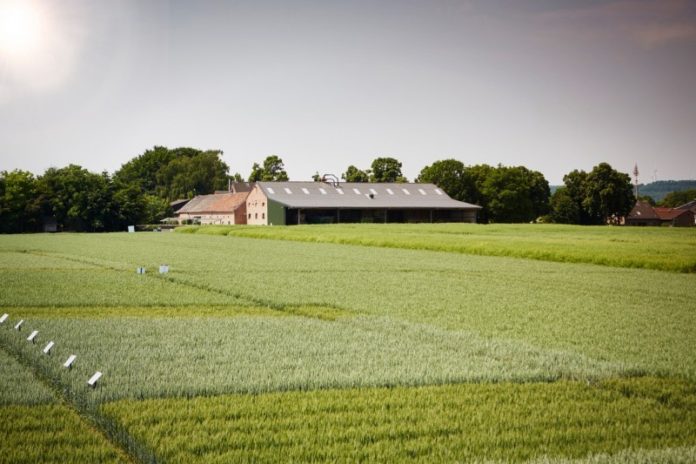
Bayer is ramping up efforts to provide agricultural solutions that advance sustainability and boost productivity at the same time. With its cutting-edge and connected portfolio, the company is driving innovations in sustainable farming together with partners and helping to tackle two of the biggest challenges of our time: food security and climate change.
At its Fields of Opportunity event on the Bayer ForwardFarm in Rommerskirchen, Germany, Bayer shows how farmers can benefit from reducing their ecological footprint while also increasing their yields.
“The pressure on food systems and on the environment is greater than ever before which is leading to an increase in global hunger,” said Rodrigo Santos, Member of the Board of Management of Bayer AG and President of the company’s Crop Science Division. “We need to accelerate the transformation of agriculture and implement solutions that are more sustainable and more productive at the same time. Re-thinking global food supply and intensifying collaboration with stakeholders on all levels is key to benefiting farmers, people, and the planet. To this end Bayer supports the combination of innovative products and digital technologies with carbon farming, low-till, cover crops and biodiversity protection.”
Against the backdrop of the looming food, energy and climate crisis, the event puts a particular focus on the following solutions and topics:
- Hybrid Wheat: Bayer’s vision is to transform wheat production as the world’s largest crop by end of the decade. Advancements in genomic tools are enabling the development of hybrid wheat at competitive costs. The new crop is expected to provide higher yield and yield stability, with the potential fit on a significant portion of the around 555 million acres of wheat grown globally. A more resilient crop may help farmers to save inputs like fuel, fertilizer, and crop protection while improving yields at the same time.
- Carbon Farming: Bayer is a leading provider of solutions and platforms that support farmers in removing carbon from the atmosphere. During the field event, Bayer will demonstrate how low-till farming and the use of cover crops help improve soil health and reduce soil erosion. As an added benefit, Bayer’s Carbon Initiative opens up new revenue streams to farmers by reimbursing them for carbon farming activities and by connecting them to the global carbon markets
- FieldView™ is Bayer’s leading digital farming platform, providing growers around the world with data and insights gathered from satellites, in-field sensors, and smart combines that enable them to manage their fields more effectively. It has been adopted on more than 200 million acres in 23 countries around the world. For farmers of all sizes and geographies, FieldView™ is the digital key lever to produce more with less inputs. Furthermore, it helps to reduce carbon emissions by maximizing farming efficiencies. The solution is closely interlinked with Bayer’s leading efforts in carbon farming.
- Crop protection plays an essential part in ensuring harvests around the world and producing greater yields on less land. Farming without targeted crop protection would massively increase land use to achieve comparable yields, resulting in a negative impact on biodiversity. Bayer is working to reduce the environmental impact of agriculture through digitally enabled precision application and new crop protection products with more favorable environmental profiles. This includes biological crop protection – a segment where Bayer is leading in the market. On top, Bayer has been investing in companies that work on sustainable alternatives to nitrogen fertilizers.
- Biodiversity: The need to produce more food on less land is one of the most important levers for fostering biodiversity as it leaves more non-cultivated space. Digital technologies like FieldView™ help to identify low-yield areas in the field that can be used for biodiversity activities like flower strips. At the same time, the environmental impact of crop protection must be reduced through innovative and targeted products combined with more precise application.
All of these topics and solutions will contribute to the ongoing transformation of agriculture. “In the future, farmers will measure the success of their farms as much by the terabytes of data captured from their fields or the tons of CO2 sequestered, as by the yield produced,” said Rodrigo Santos.
For the Fields of Opportunity event Bayer brings together leading experts from across the sector like Urs Niggli (agricultural scientist), Ruramiso Mashumba (Chairperson of Zimbabwe Farmers Union), Sara Menker (CEO of insights company Gro Intelligence) and Arianna Giuliodori (General Secretary of World Farmers Organization) to discuss solutions to overcome global hunger, support smallholder farmers and make agriculture more sustainable. The panels start at 10:00 AM CEST and can be watched via livestream.
Bayer has put sustainability at the heart of its strategy, ultimately aiming to reduce greenhouse gas emissions in major agricultural markets – per kilogram of crop yield – by 30 percent by 2030. In addition, the company works towards reducing the environmental impact of crop protection products by 30 percent by 2030 and has committed to enable 100 million smallholder farmers to become more productive and profitable farms.







